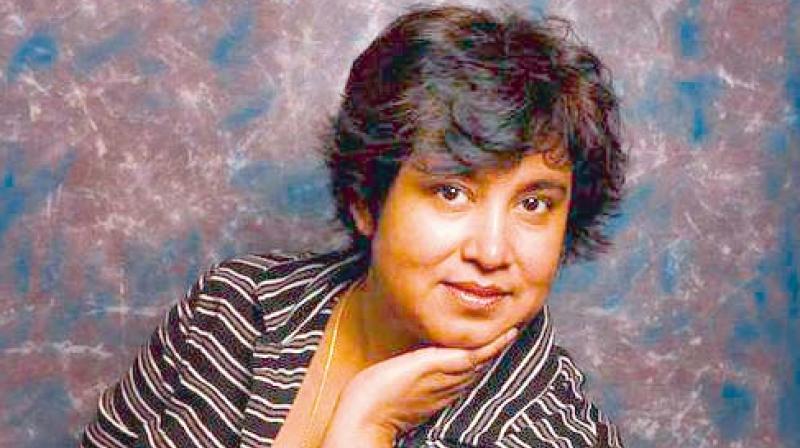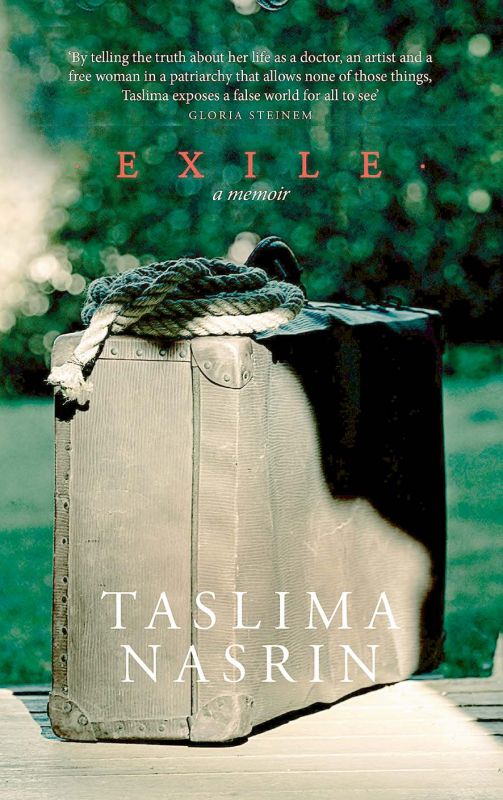Strength of a woman: Taslima Nasrin's memoir Exile is powerful, explosive
Taslima Nasrin memoir exile chronicles her struggle for survival during her seven month stay in India in 2007.

My lack of support does not mean that I will attack my opponent during their morning jog, or shoot them in public, or hack them to death. I will neither kiss nor wound my opponent; I will instead express my opinions through my writings. If someone does not like what I have to say, they have the right to respond to my opinions in kind — in words. They do not have the right to kill me. This is a basic condition for the freedom of speech which many fanatics wilfully choose to ignore.
— an excerpt from Taslima Nasrin’s memoir Exile.
The book is powerful and explosive. The author has chronicled her struggle for survival during her seven month stay in India in 2007. On November 27 that year, a religious mob took to the streets of Kolkata to vent their ire against the author. They were armed with a fatwa and demanded her ouster from the city. Thus began a harrowing experience for this feisty lady who was shunted from Kolkata to Jaipur to Delhi, where she was confined to a room in a safe house.
Taslima’s books are powerful with fierce outpourings and strong words. In reality, her voice is soft and almost inaudible. “Personally, I am gentle, when people meet me they are surprised as I write so strongly. They find me nice, kind and gentle,” says the lady who is perennially in the eye of a storm.
Exile is at once gripping and horrifying, when you realise how much physical discomfort and mental torture she has endured. You admire her ability to bravely name every individual who has proved to be an impediment in her fight for justice. A seasoned veteran, Taslima is unperturbed about possible negative reactions.
“Actually when I write books, I don’t worry about what happens because I don’t think of consequences and that’s why bad things happen to me. I had to leave Bangladesh and even West Bengal. But it’s not always about hatred. Many people love my writing too. I don’t think about the future,” she says simply.
While the term fearless is often attached to Taslima’s name, she is a woman who, ironically, lives with several fears. But she bravely reveals them, depicting the vulnerable side to the external façade of a bold gusty writer.
“As a child, I was quite fearful of going out in the dark. When I went to the zoo, I was afraid of tigers (in their cages). When I was nine years old, the Pakistani army entered our house in Bangladesh. I pretended to be asleep, they tied up my father and ransacked our home. I was afraid they would take me to some camp but maybe because I was small they spared me. I was so scared, I was not very courageous,” she confesses.
Taslima grew up in a liberal Muslim household in Bangladesh, where unlike most teenagers, who were married off at 16, her father encouraged her to become a doctor. “My father never wanted me to marry at 16. He always wanted me to become a doctor (as he was a doctor) and a professor at the medical college where I studied. He encouraged me to become independent and marry someone of my choice when I was old enough. He never asked me to pray as he was an atheist, I never saw him praying or reading religious texts and that encouraged me to become secular,” recounts Taslima.
Her confidence was bolstered by her secular father who encouraged the young girl to fight against any kind of injustice. “I had seen how women suffered. At college, many girls were forced to quit their studies as their parents forcibly married them off against their wishes. I even saw how women were getting tortured in my neighbour’s family. My own mother was oppressed. Even though dad was a wonderful person, he didn’t treat my mother well. I protested against inequality through my writing. My father had always encouraged me to tell the truth,” reveals Taslima.
It is this quest for truth that has emboldened Taslima to swim with the sharks and passionately defend the right to freedom of expression. She has fought hard and survived the onslaught misogynistic criticism. She writes: Writers across the world are being persecuted, whipped, tortured, incarcerated and exiled. But, leave alone dictatorships, even democratic governments are no longer interested in safeguarding the freedom of speech and expression.
There is no point trying to confuse the issue by saying that poverty, frustration, lack of jobs and the absence of hope force people to become terrorists. It is, in fact, the other way around. The new terrorists are often rich and literate, highly qualified professionals, who have been seduced by fanaticism.
Has her voice found resonance and acceptance in the post modern world? “Some people agree with me and some people do not. I am not an Islamophobe or anti Muslim although such people are increasing. I don’t hate the religion. I critically analyse all religions. This should be allowed in Islam as it’s allowed in other religions where people analyse their religious texts and you don’t get killed but that doesn’t happen in the Muslim world. If you want to evolve, then thinking must be allowed,” she bluntly states adding that the fatwas have not been removed. “The fatwas continue both in Bangladesh and in India,” she says in a resigned tone.
She is not welcome in her country of birth but her longing and love for India compels Taslima to return at every given opportunity. “I was not allowed to enter India for many years after I left the country. The government is still giving me a residence permit but I am unsure for how long this will continue. During my previous stay, many people wanted me to leave the country. They included Muslim fundamentalists and political leaders who wanted to get political mileage. I was even thrown out by the CPI-M party in West Bengal,” she recounts the horrors of her years in exile.
She is adamant about fighting the odds and staking her claim to live in India. “I want to live here because I have not committed any crime. I want equality for women and also work for human rights, I want to bring about a change in the Indian subcontinent. Then my life can be meaningful, I can do stuff from the US but it will not be the same. I am a permanent resident of many European countries and I can easily live in a fancy suburb but I want to do something for the society. I love India, feel at home because I have no home, I can’t feel at home in Iceland. I speak and write one of the Indian languages, love here like home love,” Taslima emphasises, despite knowing that her fight is hers alone..
I am completely alone. I have had to live away from my parents, and my family, from those who love and care for me, not out of any choice of my own. These thoughts threaten to suffocate me. Where should I go? The world is telling me to leave and survive. It is telling me to choose compassion and accolades instead of wallowing in insults and contempt. I had chosen a life here but my dreams have lost to their politics.
There is despair, sadness and frustration. Has she ever regretted her outspokenness and the consequent after-effects? “No, I don’t regret it. These struggles have made me strong.” Taslima is an unflinching optimist and that’s what makes her so special.
Excerpt from exile...
I have written about the timid, bashful and self-effacing girl who, brought up within the strictest confines of a traditional family and its everyday rules and petty injustices, got used to her dreams and desires being tossed aside without a word, while struggling to keep the preying hands of male relatives at bay.
I have written about that rather plain little girl who grew up with long-nurtured dreams of a love that she finally found in her youth, who secretly got married and wanted to spend her life just like any other woman. I have written about the girl who, betrayed by her husband, the love of her life, had been compelled — by grief, regret, pain, despair — to contemplate suicide as her fragile world came crashing down around her.
I have written about the girl who painfully gathered her shattered dreams in an effort to go on living, who wanted a place of her own in this cruel, unforgiving society, and who was forced to submit repeatedly to the guardianship of men in accordance with social mores. Yet she was hit by an onslaught of such cruelty, spite and viciousness that it destroyed her unborn child and made her bleed every night.
I have written the tale of how she gathered what little strength she had left to stand up on her feet again, not once leaning on someone else this time, fighting and living alone and only for her own self. I have recollected how she became her own refuge, how she learnt to snub social censure and archaic customs, and how every mistake she made, every stumble, every fall, only made her stronger. She gradually learnt to consider life, with all its wretchedness, as her own, and not be beholden to someone else — this is the tale I have written, of evolution, of her creation, as she was burnt to steel by the fires of patriarchy.
Did I do anything wrong? I don’t believe I did but many people around me felt that I committed a grave offence, a heinous crime, by writing such a tale. And so, I was put to a public trial. It would have perhaps not been such a big deal if I had not revealed that the girl was me, Taslima, and not an imaginary woman whose tale I had concocted. In fiction, I am allowed to fabricate a life story, celebrate a woman’s difference, and her journey of self-discovery. However, the moment there is a whiff of truth in the tale, the moment I have asserted that this is me, this is my tale of overcoming what life has put in front of me, of becoming my own person, of living life on my own terms, it is not surprising that I have offended so many people. Indeed, how can a woman speak like this! I am truly a sore misfit in this patriarchal environment.
I am a forbidden name in my country now, as well as in my beloved West Bengal, a prohibited person, a banned book. My name cannot be uttered lest the tongue catch fire, I must not be touched as I might pollute, and I should definitely not be read lest it spark rage and unrest. This is me; thus I have always been. Even if Dwikhandito leaves me shattered into a thousand fragments, I will never admit that I have done anything wrong. It is not wrong to write one’s autobiography, to want to share one’s deepest and darkest secrets. The first condition of writing an autobiography is the complete transparency regarding the facts of life, and not sly compromises to avoid uncomfortable truths and proverbial skeletons.


